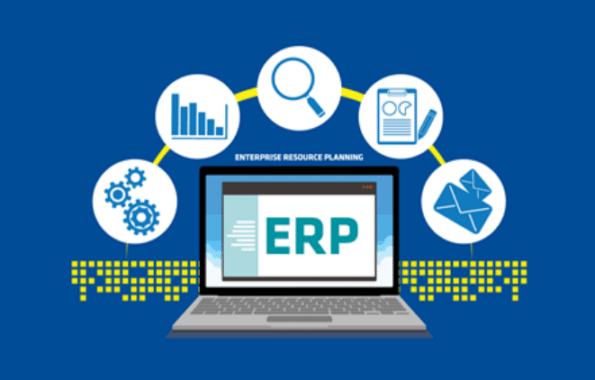ERP Online: Unlocking Efficiency and Flexibility for Modern Businesses – In the fast-paced digital age, businesses constantly seek ways to streamline operations, enhance efficiency, and remain competitive. One of the most powerful tools for achieving these goals is an ERP online system. ERP (Enterprise Resource Planning) has long been essential for managing and integrating core business processes. The evolution of ERP from traditional on-premise solutions to online ERP systems—also known as cloud ERP—has transformed how companies operate, offering unparalleled flexibility, scalability, and cost-effectiveness.
This article explores the concept of ERP online, its key features, advantages, and challenges, and why businesses of all sizes increasingly turn to cloud-based ERP solutions to optimize their operations and stay competitive.

What is ERP Online?
ERP online refers to ERP software hosted on cloud servers rather than installed on a company’s local servers or company. Cloud-based deployment allows businesses to access the ERP system through the Internet, making it available from anywhere at any time. Cloud ERP systems are typically offered as a Software-as-a-Service (SaaS) model, where businesses subscribe to the service and access the ERP platform via a web browser or mobile application.
This online ERP offers the same functionality as traditional ERP systems, including modules for finance, human resources, supply chain management, customer relationship management (CRM), and more. The key difference is the delivery method and infrastructure, which provide enhanced flexibility, scalability, and ease of access.
Key Features of ERP Online
Cloud-Based Infrastructure ERP online operates on cloud-based infrastructure, meaning the ERP software and data are stored on remote servers maintained by the service provider. This eliminates the need for businesses to invest in and keep their servers and IT infrastructure. The cloud-based nature of online ERP enables seamless updates, backups, and maintenance by the vendor, ensuring that the system is always up to date.
Real-Time Data Access One of the standout features of ERP online is its ability to provide real-time data access from any location with an internet connection. This is particularly beneficial for companies with remote teams, multiple locations, or employees who need to access the system while traveling. Real-time access ensures all users work with current information, improving decision-making and collaboration.
Modular Design Like traditional ERP systems, online ERP is typically modular, meaning businesses can choose the functionalities they need. Standard modules include financial management, inventory management, procurement, human resources, sales, and CRM. This modular approach allows businesses to tailor the ERP system to their unique requirements, adding or removing modules as their needs evolve.
Automation ERP online automates many routine business processes, reducing the need for manual intervention. Automation features in areas like invoicing, payroll, inventory management, and reporting streamline operations, save time, and reduce errors. Automating repetitive tasks allows employees to focus on more strategic activities that add excellent value to the business.
Mobile Access Most modern online ERP systems are mobile-friendly, allowing users to access the platform through smartphones and tablets. This is a significant advantage for businesses with on-the-go employees, such as sales teams or field service workers, who need to update records, check inventory, or generate reports from the field.
Scalability One of the most significant benefits of ERP online is its scalability. As a business grows, the ERP system can quickly scale to accommodate additional users, locations, or business functions without requiring significant infrastructure investments. This flexibility makes online ERP systems ideal for growing businesses or companies that experience seasonal fluctuations in demand.
Security and Data Backup Cloud-based ERP online systems are designed with security in mind. Service providers implement robust security protocols, including encryption, firewalls, and regular backups, to protect sensitive business data. With regular automatic backups, businesses can also be assured that their data is protected in case of a hardware failure or data breach.
Advantages of ERP Online
Cost-Effectiveness One of the primary reasons businesses opt for ERP online is its cost-effectiveness compared to traditional on-premise solutions. With cloud-based ERP, businesses don’t need significant content investments in hardware, servers, or IT infrastructure. Instead, they pay a subscription fee, typically covering maintenance, updates, and support. This reduces the total cost of ownership (TCO) and makes ERP more accessible to small and mid-sized businesses.
Rapid Implementation ERP online systems generally have faster implementation times than on-premise solutions. Since the system is hosted on the cloud, there is no need for extensive hardware setup or complex installations. Depending on their requirements, businesses can begin using the software within weeks or even days. This accelerated implementation allows companies to start reaping the benefits of ERP more quickly.
Improved Collaboration and Accessibility With ERP online, employees from different locations and departments can access the same system in real time, facilitating better collaboration. Everyone can work with the latest information, whether it’s a sales team updating customers’ orders or a finance team reviewing budgets. This improved accessibility ensures that teams can make more informed decisions and work more efficiently.
Automatic Updates and Maintenance One of the challenges with traditional ERP systems is the need for regular updates and maintenance, which can be time-consuming and costly. With ERP online, the software provider handles all updates, ensuring the system is constantly updated with the latest features, security patches, and improvements. This eliminates downtime and reduces the burden on internal IT teams.
Flexibility and Customization Many ERP online systems offer a high degree of flexibility, allowing businesses to customize workflows, reports, and dashboards to suit their needs. This flexibility makes online ERP systems adaptable to different industries and business models. Additionally, businesses can add new modules or integrations as their operations evolve, ensuring that the ERP system grows alongside the company.
Disaster Recovery and Business Continuity Cloud-based ERP online systems provide robust disaster recovery capabilities. Since data is stored in the cloud, it is protected from local hardware failures, power outages, or other disruptions. In a disaster, businesses can quickly recover data and resume operations with minimal downtime. This ensures business continuity and reduces the risk of data loss.
Scalable for Growing Businesses As businesses grow, their operational needs change. ERP online is inherently scalable, allowing businesses to easily add new users, locations, or functions without requiring significant upgrades. This scalability is particularly beneficial for companies that experience rapid growth or fluctuating demand, as they can adjust their ERP system accordingly.
Challenges of ERP Online
While ERP online offers numerous benefits, there are also some challenges to consider:
Data Security Concerns Although cloud-based ERP systems are generally secure, some businesses may have concerns about storing sensitive data on external servers. These concerns are particularly prevalent in industries with strict regulatory requirements, such as healthcare or finance. However, most reputable ERP providers offer robust security measures to address these concerns, including encryption and compliance with industry standards.
Dependence on Internet Connectivity Since ERP online systems are accessed through the Internet, businesses depend on a stable Internet connection. If the internet connection is slow or unavailable, it can disrupt access to the ERP system and hinder operations. However, with the increasing availability of reliable internet connections, this challenge is becoming less of a concern for many businesses.
Subscription Costs Over Time While ERP online systems generally have lower upfront costs, businesses must factor in ongoing subscription fees. These subscription costs can add up over time, particularly for large organizations with many users. However, the cost savings from reduced IT infrastructure, maintenance, and faster deployment often outweigh the subscription costs.
Customization Limitations Some ERP online solutions may have limitations in terms of customization compared to traditional on-premise systems. While many cloud ERP providers offer customization options, they may not be as extensive as those in highly tailored on-premise solutions. Businesses with very specific or complex workflows may need to evaluate whether the online ERP system can meet their customization needs.
Industries Benefiting from ERP Online
Businesses across various industries are reaping the benefits of ERP online, including:
- Manufacturing: Cloud ERP systems streamline production planning, inventory management, and supply chain coordination, helping manufacturers optimize operations and reduce lead times.
- Retail: Retailers use ERP online to manage inventory, sales, and customer data in real time, enabling better inventory control and improved customer experiences.
- Healthcare: Healthcare organizations use online ERP systems to manage patient data, billing, and regulatory compliance, ensuring smooth operations and improved patient care.
- Professional Services: Service-based industries leverage cloud ERP to manage projects, track billable hours, and handle client relationships, ensuring efficient resource allocation and timely project delivery.
Conclusion
ERP online represents a significant shift in how businesses manage their operations. It provides greater flexibility, scalability, and cost-effectiveness than traditional on-premise ERP solutions. By leveraging the power of the cloud, businesses can streamline processes, improve collaboration, and make real-time data-driven decisions.
For growing businesses or those with distributed teams, ERP online offers the perfect blend of accessibility and functionality. While there are challenges, such as data security and ongoing subscription costs, the benefits—from improved efficiency to enhanced disaster recovery—make ERP online a compelling choice for companies looking to modernize and future-proof their operations.
As more businesses adopt ERP online, it’s clear that cloud-based ERP is no longer just a trend but a strategic tool that drives long-term success in the modern digital economy.

